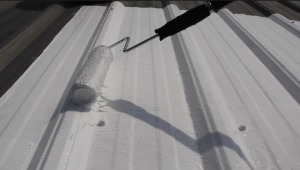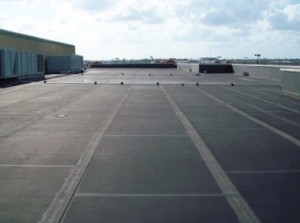DO YOU NEED A CUSTOM ROOF ON YOUR BUILDING?
Today’s commercial roof construction market consists of two categories: custom roofs and factory made roofs. The roofs in each category have advantages and disadvantages to them, and neither category is optimal in every situation. We’ll look at each category in detail to see which system works best in which situation, but before we can do that we need to define what type of roof fits into each category.
Custom Roof Definition
Custom made roofs are what we like to consider roofs that are “manufactured on the job site”. This includes all spray applied roofing systems, such as sprayed polyurethane foam, silicone and acrylic coatings, etc. The materials for these systems are manufactured in a plant, but the actual roof membrane is applied directly to the building and is therefore what we call custom made.
Factory Made Roof Definition
As you may have already figured out, factory made roofs are made in a factory. Metal roofs, single-ply, and any other system that is pre-fabricated and applied to the roof in rolls or panels is factory made. These roofs are built on an assembly line and any pieces that don’t fit (because of protrusions or other obstacles) must be modified on the roof. They receive a level of customization, but they are primarily made in a factory with no consideration of the roof layout.

Custom Roof Strengths
There are some very significant strengths and advantages to installing custom roofs, otherwise no one would use them. The primary advantage of a custom roof is the lack of seams on the roof surface. Because it isn’t made up of panels that are fit together, there are no seams to form weak spots or leaks which make custom roofs a great option for building owners.
Another major advantage of custom roofs is improved flashing around edges and any roof protrusions. The roof is spray-applied, and is therefore extremely versatile and capable of being applied directly to edges and protrusions without any seams or gaps. This means fewer leaks around protrusions, which everyone loves.
Finally, custom roofs are the perfect fit on any roof, no matter the design. Barrel roofs, multi-level roofs, poorly sloped roofs, roofs with many protrusions, or roofs with any other obstacles to be fought can all be conquered with a spray-applied custom roof. That perfect fit means you don’t worry about leaks, and also adds strength to the roof as each protrusion is another gripping point for the membrane, rather than a weak spot.
Custom Roof Weaknesses
All of the weaknesses associated with a custom roof stem from installation difficulty. These roofs are not a simply “plug and play” system where you can take parts out of a box, attach them to the roof, and then go home. While installation can be an easy process once a user is experienced, the first several applications are extremely difficult.
The largest weakness of a custom roof is that the applicator will need many hours of training and practice prior to installing a quality roof. Working on spray technique, knowledge of certain situations and how to handle difficult obstacles are all part of the training and practice process that is required.
Another weakness of a custom roof is that there is some expensive, unique equipment required. A tool for a metal roof may also be useful when applying single-ply, but spray-applied custom roofs require specialized spray equipment that can really only be used on one system. This additional cost is a weakness, but it can be recouped through profits.

Factory Made Roof Strengths
The materials of a factory made roof are typically cheaper than custom roofs because they are made in bulk, typically through automation. These cost savings are one of the greatest strengths of a factory made roof.
Another major strength of a factory made roof is that nearly anyone can install them and do a good job. They don’t require months or years of practice and training as a custom roof does, so you can trust any number of contractors to do a good job when they install your factory made roof. With that being said, these systems aren’t foolproof and you will still need to verify the quality of the contractor’s work prior to hiring them.
Factory Made Roof Weaknesses
The biggest weakness of factory made roofs is the existence of seams. These systems are typically roll-applied or applied in panels, and therefore they must be fastened, taped, or melted at the seams. This leads to loss of heat through the roof, the potential for roof failure in the form of deterioration, and the potential for leaks at the seams. This is by far the biggest concern of factory made roofs.
Another weakness of factory made roofs is difficulty handling roof protrusions and edges. The panels or rolls often don’t line up perfectly with these obstacles and when they are installed this can lead to problems.
Conclusion
Custom roofs and factory made roofs both have strengths and weaknesses that must be evaluated by the building owner. No single roof or roof category is the best for every situation, so it is up to the building owner to determine what they want out of their roof and which system meets their needs best. If you have any questions about these roof categories or how our systems fit into them, don’t hesitate to give us a call! Also, if you’d like to receive our newsletter with links to all of our blog posts, subscribe on the right.